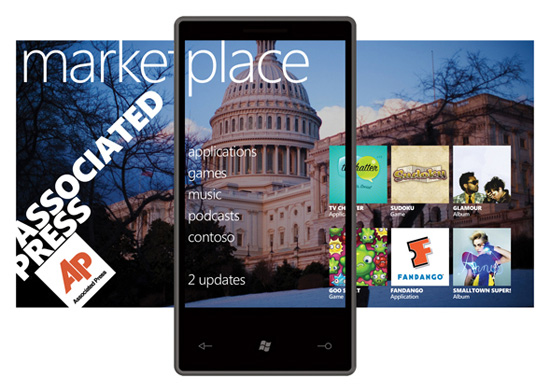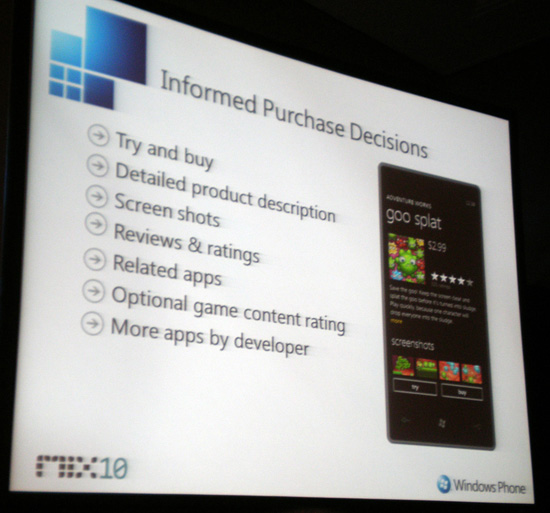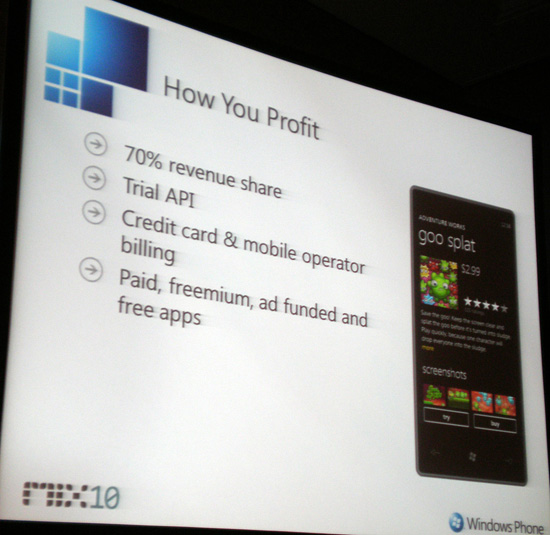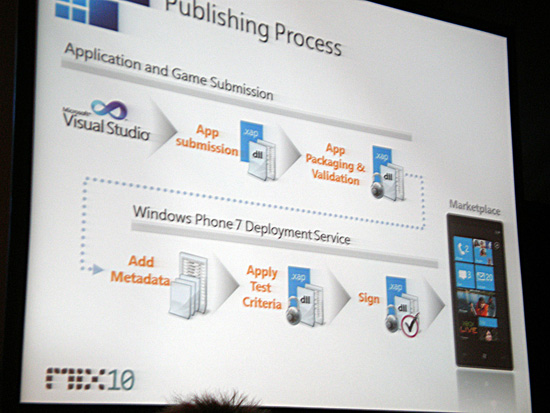Windows Phone 7: The AnandTech Guide
by Brian Klug on March 21, 2010 12:00 AM EST- Posted in
- Smartphones
- Windows Phone 7
- Mobile
Marketplace and Third Party Applications
The Windows Phone Marketplace is the exclusive way for users to install applications on WP7S - though corporate developers building applications for a few hundred people were promised their own alternative before launch. The marketplace hub itself is, for all intents and purposes, very similar to Apple's App Store marketplace model. There's one-time billing method entry, support for updates, categories, featured and rated applications, and everything we've grown used to expecting from an "App Store."
However, there are a few notable and important exceptions. First off, the marketplace will be the exclusive place to purchase LIVE enabled games, music, and third party applications. Virtually everything you can buy on the phone will be sold through marketplace.

Next on the list is that marketplace will allow an API for developers to distribute trials of their software. Developers can design whatever trial expiration criteria suits them; during sessions examples such as elapsed time, level based, or number of application launches were tossed around. After the trial expires, the marketplace works just like you'd expect it to - users can be upsold either directly through the application, or the marketplace directly. This is a boon for try before you buy shopping, which is still absent from Apple's App Store, leading popular developers to create "lite" titles. Of course, in that scenario, user data is lost when migration from lite to full versions takes place. Because the trial marketplace application in most cases is the full version (just with trial checks inside), user data will not be lost when a user upgrades to the full version.

In addition, carriers can sideload and preload applications on WP7S. This is the "Contoso" menu item in the above picture (Pocket PC and Windows Mobile users should be familiar with the reference). Letting carriers value-add through both sideloading and preloading their own branded applications is a mixed bag. On one hand, it's a bargaining chip WP7S has to bring to the table when OEMs sit down and negotiate bringing hardware to a specific carrier. On the other, it ultimately leads, again, to a fractured user experience. Out of the box, applications available on one carrier will not be available on the other. At present, no carrier has truly offered a compelling application, but it isn't farfetched to see something like that happening eventually. There's also of course the stigmata attached to buying a phone preloaded with a bevy of carrier-branded applications. There's a perception that a clean wiped device is exclusive or higher-end - it's the OS X and iPhone effect here - and Microsoft will have to be careful about what it allows carriers to preload to avoid overwhelming end users or damaging its brand.
But what carriers are really going to like is the optional way the marketplace can bill app purchases. In addition to traditional credit card billing, billing through the mobile operator is now an option, one which will no doubt appease carriers even more worried about becoming "dumb pipes." No details were disclosed during MIX10, but there's no doubt some revenue sharing that will take place between Microsoft and carriers should they go this route. Developers still get the disclosed 70% revenue share either way.

Third party applications will present themselves primarily as "tiles" on the main launch page (note that third-party applications can only be single-wide tiles; double wides are reserved for first-party applications). Additionally, tiles can also extend themselves through appropriate "hubs." This is where Microsoft hopes to begin to chip away at the application-centric design other platforms are built around. An example given was how WP7S' colorize application both exists as a tile, and an entity within the pictures hub - it can be launched in either place since ultimately it modifies pictures.
The remainder is all the details. Marketplace application submission will begin this coming summer, illustrating that Microsoft wants a strong catalog of applications at launch beyond what we've already seen. At present, the marketplace will support application sales in 30 markets worldwide, illustrated below. There's still a $99 yearly fee to be part of the development program and submit applications, although developers can collect revenue even after their yearly subscription has expired. In addition, debugging on a hardware of your choice (rather than the emulator) will require an unlock through a registration process with Microsoft.
.jpg)
Marketplace - Application Vetting
Marketplace also comes with the caveats attached to a uniform application distribution model, not the least of which includes a validation, vetting, and digital signature process for all applications. Let's be clear - WP7S only runs signed code, and to get that signature, you'll need validation. Each time you run the application, WP7S will check that application's signature against the marketplace, both to check that it's valid, and that hasn't been revoked. Yes, marketplace has an application kill-switch.

Application Submission Workflow
There are three major categories of testing criteria thus far. Microsoft is calling them "test criteria pillars":
- Technical Validation
- Applications are reliable
- Applications are resource friendly
- Applications are free of malicious software
- Applications do not interfere with phone functionality
- Policy Validation
- Meets Microsoft standard for global content policies
- Meets application type guidelines
- Market Validation
- Evaluated against regional policies - is it legal to sell in this market?
- Localization review
They've strongly emphasized that this process will be completely open, that an NDA will not be required to see the application provider agreement, and that they will "publish everything about how the marketplace works." I was on the edge of my seat the whole time for more specific details or a screenshot of a developer access panel with clearly marked status steps, but no such details came. I get the feeling they're still trying to strike some kind of balance between policy requirements and openness that actually fosters useful and innovative applications. Microsoft insists that this kind of application vetting is necessary to deliver "really good end user experiences." Part of that is only allowing "developers with the best intentions" into the marketplace.
There's also the disturbing "content policies" smell test under policy validation. This is a nod to the arguably draconian policies that recently resulted in sweeping deletion of softcore porn applications from Apple's App Store. Microsoft is apparently taking a similar route of having applications pass a content test for validation - at a PG-13 rating. Sorry folks, that means no softcore porn applications in the marketplace.
As far as turnaround time from submission to approval to marketplace presence ready-for-purchase, Microsoft is hoping to meet a 5 day turnaround time for 98% of content. Thus far, they've been successfully meeting that bar for Windows Mobile's "Windows Marketplace for Mobile," hopefully there's equally little friction for WP7S' "Windows Phone Marketplace."
So on one hand, Microsoft is pinky-swearing they won't be evil and will actually tell you what they're doing during application approval, but on the other, haven't given any specific examples. This is another circumstance where the details just haven't been fleshed out yet. Time will tell exactly how open this process is, and whether in practice it's any different than Apple's controversial App Store model. Microsoft has already launched a large number of partners, and demonstrated at least 14 third party applications already in development, which you can see in the gallery below.
















55 Comments
View All Comments
pcfxer - Sunday, March 21, 2010 - link
Android is far easier to develop for than WM and iPhone. For my engineering project my team is developing a device for non-verbal users.pro5 - Monday, March 22, 2010 - link
Is android Java only? (I don't know) but if so that would reason enough for me not to develop for it. C# and objective C are 'bad enough' but java has always left me cold (I'm a C++ coder mainly).If it can use native C++ then great, still doesn't make up for it's other short comings. The only real advantage I see to Android is how 'open' it is, but really that's more of killer than a helper in the dev community (if money is your goal). How does the GPU compare to Winphone for example? Where is the 'standard' development target (screen size, hardware features). Stuff like iPhone and WP7 are 'easier' to develop for because you never need to 2nd guess the user's hardware config or screen size (ok 2 sizes in the case of WP7 in future)
Penti - Monday, March 22, 2010 - link
Android has the NDK so you can run native code, you don't need to run your code in dalvik. That means C and C++. Just as any other Linux based Phone OS. Such as WebOS. Of course Maemo too. Bada too of course, and of course none Linux based Symbian.The shit runs at the same hardware so what's your problem? Nobody is forcing you to develop for free. That you can release your apps without review is not a bad thing. Apps such as Firefox (Fennec) are ported to Maemo and being ported to Android. There's an Alpha for WinMo too. Something that can't be done on iPhone OS or Blackberry. Or WP7. If you only want to develop for a specific phone thats fine, but then you miss millions of other users. Even if you do android apps you don't need to support every single phone there is. Old phones won't be upgraded to newer versions of Android OS any way. And it's really the software platform that should have the focus any way.
jms102285 - Saturday, April 3, 2010 - link
Hey Anand, I sent you an E-mail regarding what the implications of Microsoft Communications Server just before the release of the WP7 is.... I haven't heard anything back yet in over a week from anyone I mailed about it.Are you guys tight-lipped about it because of NDAs or something???
CSMR - Sunday, March 21, 2010 - link
Not really (http://jkontherun.com/2009/11/23/windows-mobile-vs...">http://jkontherun.com/2009/11/23/window...droid-wi... but hopefully it will be within a year.I'm hoping that it will get full, reliable exchange support (e-mail+calendar+tasks+scheduling meetings+search server etc.).